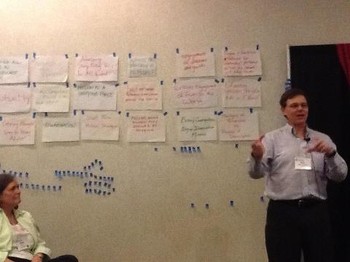Poverty. Evangelism. Violence. After a weekend of conversation, worship and prayer, the 200 people gathered here Oct. 5-7 for the Dallas II consultation determined that the Presbyterian Church (U.S.A.)’s mission work should be centered on those three issues.
But that seemingly straightforward vision is multilayered, pulling in topics like theology, history, reconciliation, justice, resources, vocation, partnership and peace building. Those topics and more shaped this weekend, whose purpose was to “create a trail guide for the movement,” said Elder Rick Ufford-Chase, executive director of the Presbyterian Peace Fellowship and a facilitator of Dallas II.
The consultation, officially called “Dallas II — Better Together: Collective Impact for God’s Mission,” was led by an open-space process, meaning that participants themselves set the agenda and topics, leading to nearly 50 discussion sessions on Oct. 6. The session topics were suggested by participants after small-group discussions and brainstorming sessions about how they see Presbyterian mission in five years.
“It’s designed to bring out all of your passion and let people wrestle with things together and get passionate about things,” Ufford-Chase said of the discussion sessions. “You’re responsible for being engaged.”
That energy and sense of self-determination carried the weekend. Unlike many conferences, in which participants attend preplanned workshops with designated speakers, Dallas II had the sense of a grassroots movement in which all participants were also leaders and facilitators.
During brainstorming sessions, some participants jumped in to help with microphones and tape up paper on which others had written ideas while others took on the task of organizing those ideas into categories.
About 50 participants volunteered to stay up late on Saturday, working to organize the feedback from the day’s discussions. They settled on a tree motif, with the consultation-determined values of abundance, transformation, prayer and mutuality forming the roots. The trunk of the “mission tree” is made up of themes such as holistic Reformed education and theology, multigenerational engagement and life-changing evangelism and advocacy.
“Nothing can happen without that foundation of a trunk that is vibrant and strong,” Ufford-Chase said.
The three central themes of poverty, evangelism and violence — which echo World Mission’s critical global issues — form the tree branches, with action plans engaging the whole church composing the canopy. Those action plans include short-term mission trips rooted in broader strategies and relationships and equipping and enabling all churches to participate in mission.
Dallas II also included former and current mission co-workers and Young Adult Volunteers, representatives from ecumenical organizations, and U.S. and global ecumenical partners from such countries as Taiwan, Russia and Colombia.
The consultation followed up on Dallas I, which took place in 2008. That consultation, formally called “Renewed Call to Presbyterian Mission in the World! A Dialogue for Our Shared Future,” brought together Presbyterians engaged in mission around the world. They identified core values and mission practices that have come to characterize Presbyterian mission work.
Worship and music played a large role in the weekend, with participants singing songs from a variety of cultures. On Saturday, after hearing Matthew 12:46-50, in which Jesus says that whoever does God’s will is His brother, sister and mother, participants were given photographs of people in various settings. Participants were asked to imagine that these people were their family members, to imagine their daily lives, their homes, their jobs.
“Let us not pray for those who are hungry, because we are all hungry,” said worship leader the Rev. Corey Nelson.

